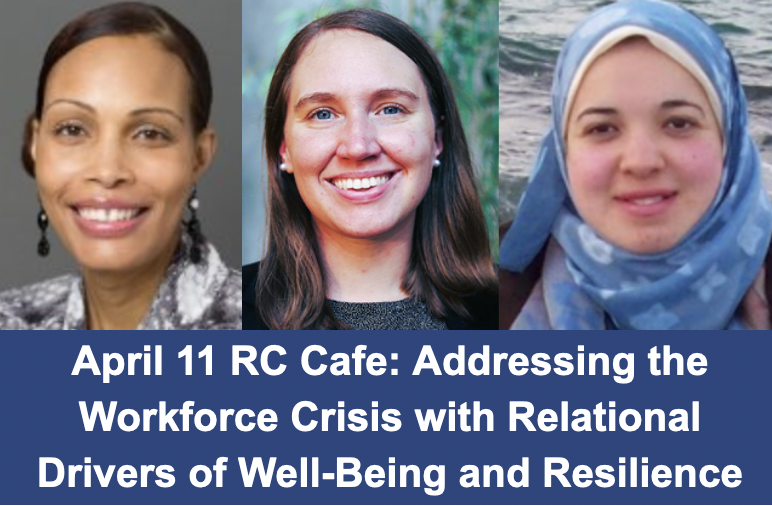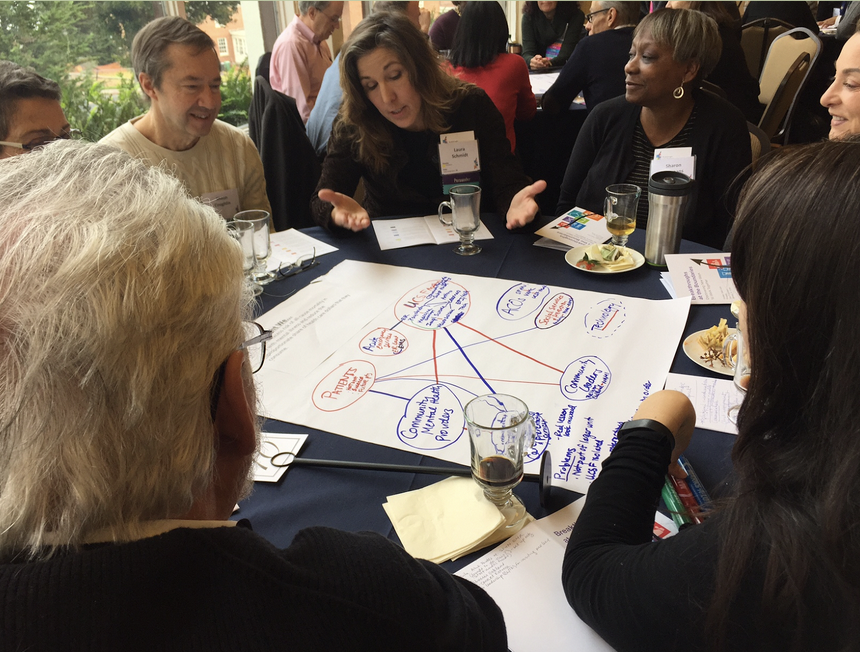
Addressing the Workforce Crisis
Addressing the Workforce Crisis with Relational Drivers of Well-Being and Resilience
RC Cafe - April 11, 3:00-4:00 pm ET
Sherita House and Heba Ali will share how to create worker well-being based on their research - and their lived experiences as clinicians and leaders, facilitated by Casey Heely. We look forward to seeing you there and hearing about your work whether in healthcare, education, human services or tech.
Dr. Sherita House, PhD, RN, is an assistant professor at University of North Carolina Greenboro. Her program of research focuses on health systems interventions to improve care processes and staff outcomes among health care professionals in civilian and military hospitals. Her research addresses improving care coordination among healthcare professionals with interdependent task and complex work processes. She has experience in quantitative and qualitative research methods. Her work has been funded by private foundations and the Tri-Service Nursing Research Program designed to support military nurse scientists on active duty and in the reserves. Dr. House is currently developing and testing relational coordination training interventions to improve staff outcomes with multidisciplinary teams in the clinical setting.
Heba Naim Ali, MBBS, MSc, is a researcher and data analyst with deep expertise in Relational Coordination (RC) and Social Network Analysis (SNA), as well as more traditional analytic methods such as econometrics. Ali is a PhD Candidate at The Heller School at Brandeis University, exploring the organizational and relational factors that shape service delivery and employee well-being in the context of vulnerable populations seeking to live in the community. Ali is co-author of Relational Analytics: Guidebook for Analysis and Action and numerous scholarly articles. She serves Relational Coordination Analytics as Director of Operations and Data Analytics, offering strategic direction for the company as well as hands-on support for clients who seek to incorporate relational coordination data and insights into their improvement projects and their daily operations.
Casey Heely, MHS, RN, BSN, is a PhD in Social Policy student at The Heller School at Brandeis University with a concentration in Health Policy. She received a Master of Health Science degree from Clark University with a concentration in Health Equity. She earned a Bachelor of Science in Nursing degree and a minor in English Journalism from Fairfield University. Following her undergraduate studies, she became a Registered Nurse and worked in Pediatric Intensive Care Units until transitioning to work for a telehealth start-up focused on diagnostic testing in the home. Her research interests include the healthcare workforce, health equity, social determinants of health, and evaluating access to primary and preventative care, especially for underserved populations, within the framework of healthcare and health policy in the United States.
Background
Worker well-being is a challenge for all organizations, especially in times of crisis (Nembhard, Burns & Shortell, 2020). In healthcare, education, social service and other sectors, burnout was already high (Donelan, 2002; Shanafelt et al., 2015) then exacerbated by the pandemic (Dillon et al., 2022), leading to the Great Resignation.
Stress has continued as organizations reorganize to meet the needs of their changing environments. How to respond? Relational coordination is one useful response due to its ability to drive quality and efficiency outcomes for organizations while supporting worker well-being and resilience (Bolton et al, 2021). First, relationships facilitate the coordination of work across multiple boundaries, helping workers to accomplish their jobs more effectively with less wasted effort (Gittell, Weinberg, Pfefferle & Bishop, 2008; Weinberg, Lusenhop, Gittell & Kautz, 2007). Secondly, high-quality relationships foster a keen awareness of and attunement to the needs of others (Williams & Dutton, 1999; Dutton, 2003; Dutton & Heaphy, 2003; Dutton & Ragins, 2007).
As a result of both dynamics, relational coordination is a significant predictor of greater job satisfaction, greater work engagement and reduced burnout (e.g. McDermott, et al, 2019; House, Wilmoth & Kitzmiller, 2022; House et al, 2023; Ali et al, 2023).

















